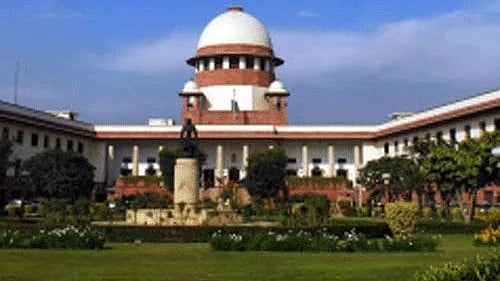
The Supreme Court of India.
Credit: DH File Photo
New Delhi: The Supreme Court on Tuesday struck down a part of the Centre’s January 29, 2025, notification, which exempted construction projects related to industrial sheds, schools, colleges, and hostels from obtaining prior environmental clearance under the Environmental Impact Assessment (EIA) Notification, 2006.
A bench of Chief Justice of India B R Gavai and Justice K Vinod Chandran said it cannot see the reason behind the exemption for the industry and educational buildings.
The court said if any construction activity of an area of more than 20,000 sqm is carried out, then it will naturally have an effect on the environment.
Under the EIA regime, any building or construction project with a built-up area equal to or greater than 20,000 sqm requires prior environmental clearance. The impugned notification had amended Clause 8 of the schedule to the 2006 EIA Notification.
The bench emphasised that the court had always focused on sustainable development.
It held that the exemption for educational purposes was arbitrary and contrary to the purpose of the Environment Protection Act.
The bench said natural resources must be held in trust for future generations and development must be balanced with environmental protection.
“It is common knowledge that education is no longer a merely service-oriented profession and has also become a flourishing industry,” it said.
The order on a petition filed by the NGO, which challenged both the January 29 notification and a subsequent office memorandum dated January 30.
In February 2025, the court had put on hold the operation of the notification in a PIL filed by the NGO. This order also applied to an office memorandum dated January 30, 2025, which was operational for Kerala.
The court declined to consider the Centre’s plea that there is a guideline to ensure such projects would follow environmental safeguards.
“If any construction activity in any area more than 20,000 sqm is carried out, it will have an environmental impact even if it’s for industrial or educational purposes, and discrimination cannot be made with similar such institutes,” the bench said.
Senior advocate Gopal Sankaranarayanan said similar attempts in 2014, 2016, and 2018 had been struck down or stayed by courts.
